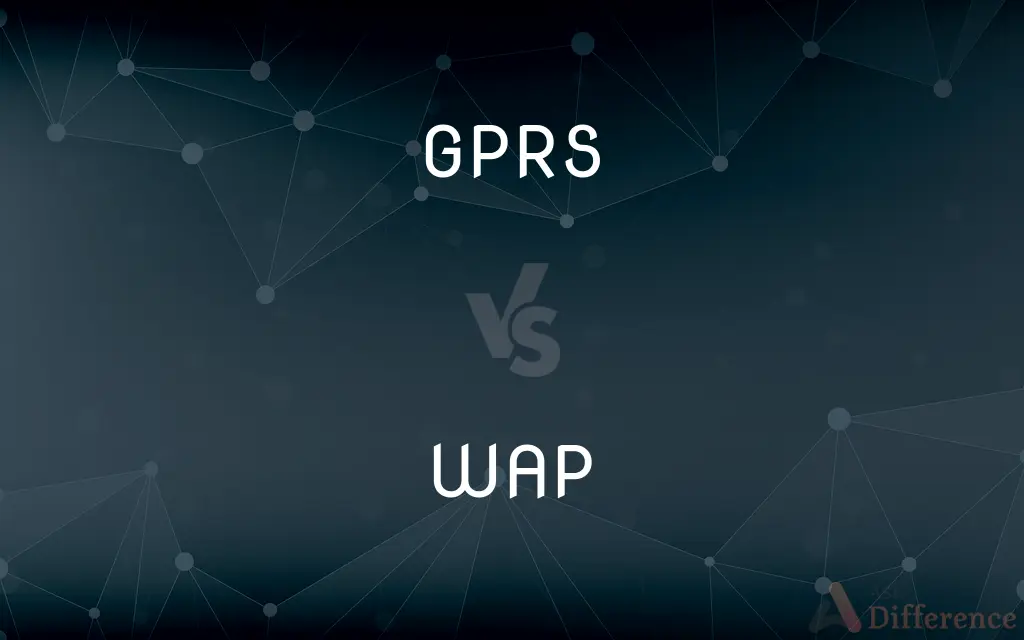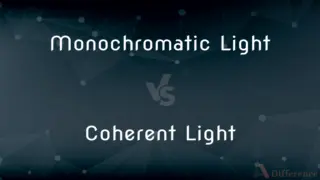GPRS vs. WAP — What's the Difference?
Edited by Tayyaba Rehman — By Fiza Rafique — Published on November 2, 2023
GPRS is a mobile data service; WAP is a protocol enabling mobile devices to access the internet. Both work together for mobile internet.

Difference Between GPRS and WAP
Table of Contents
ADVERTISEMENT
Key Differences
GPRS stands for "General Packet Radio Service" and is a technology that allows mobile phones to connect to the internet. On the other hand, WAP, or "Wireless Application Protocol," defines how wireless devices access and browse web content.
GPRS functions as the data service, allowing mobile devices to send and receive data packets over a cellular network. WAP, conversely, is the set of protocols that makes it possible for these devices to render and understand web content optimized for small screens.
Using GPRS, mobile devices can achieve continuous internet connections. This enables services like MMS and mobile web browsing. WAP, with its specialized protocol, ensures that web pages are displayed in a manner suitable for mobile devices, given their limited display capabilities.
When someone uses their mobile device to access the internet, it's GPRS that establishes the data connection. However, when they open a web page, it's WAP that ensures the content is presented in a mobile-friendly format.
It's important to note that while GPRS and WAP can work in tandem, they serve distinct functions. GPRS concerns the data transmission, while WAP pertains to the user experience of web content on mobile devices.
ADVERTISEMENT
Comparison Chart
Full Form
General Packet Radio Service
Wireless Application Protocol
Primary Function
Mobile data service
Protocol for accessing web content on mobile devices
Related to
Data transmission over cellular networks
Displaying web content optimized for mobile screens
Dependency
Can work independently
Often relies on data services like GPRS for internet access
Notable Usage
Mobile internet, MMS, email
Mobile web browsing, WAP push messages
Compare with Definitions
GPRS
GPRS allows for packet-based data transmission.
GPRS made it possible to use apps requiring a continuous internet connection.
WAP
WAP supports web applications designed for mobile use.
The WAP push service was a popular feature in early mobiles.
GPRS
GPRS functions over 2G and 2.5G networks.
The older model phone still had GPRS capabilities on its 2G network.
WAP
WAP makes internet content accessible on small screens.
Many early websites had a WAP version for better mobile display.
GPRS
GPRS is a data service for mobile devices.
Her phone uses GPRS to send emails.
WAP
WAP is a set of protocols for mobile internet use.
The website had a WAP version optimized for mobile users.
GPRS
GPRS provides moderate-speed internet on cellular networks.
She noticed the GPRS connection was slower than her home Wi-Fi.
WAP
WAP offers a gateway between mobile devices and the web.
WAP acts as a bridge, translating web content for mobile screens.
GPRS
GPRS enables internet connectivity on mobile phones.
With GPRS activated, he could browse websites on the go.
WAP
A blow or beating; a whap.
WAP
(colloquial) A breast.
WAP
A bundle.
WAP
A weapon, gun.
WAP
To beat; to whap.
WAP
To engage in sexual intercourse.
WAP
To wrap or bind.
WAP
To beat; to whap.
WAP
A blow or beating; a whap.
WAP
WAP enables mobile web browsing.
He accessed the site using the WAP browser on his phone.
Common Curiosities
Can a device use WAP without GPRS?
While WAP is a protocol for displaying web content, it typically relies on data services like GPRS for actual internet access.
Is GPRS the same as mobile internet?
GPRS is a type of mobile data service, often considered an early form of mobile internet.
What does GPRS stand for?
GPRS stands for General Packet Radio Service.
How fast is a GPRS connection?
GPRS typically offers speeds between 56-114 kbps, which is slower than modern 3G, 4G, or 5G connections.
What's the primary function of WAP?
WAP's main function is to enable mobile devices to access and display internet content.
Which one came first, GPRS or WAP?
Both GPRS and WAP emerged around the same time in the late 1990s, with GPRS focusing on data transmission and WAP on content display.
Can modern smartphones still use WAP?
Modern smartphones can support WAP, but they primarily rely on more advanced web browsers and faster data services.
Are GPRS charges different from regular call charges?
Yes, GPRS charges are typically based on data usage, separate from voice call charges.
Were there specific WAP sites?
Yes, many websites had WAP versions optimized for mobile browsing in the early days of mobile internet.
What's the relationship between GPRS and 2G?
GPRS is often associated with 2G and 2.5G cellular networks, serving as an enhancement to provide internet connectivity.
Is GPRS still relevant today?
While GPRS laid the groundwork for mobile internet, modern devices mostly use faster technologies like 3G, 4G, or 5G.
Can WAP be used over Wi-Fi?
While WAP is primarily designed for cellular networks, it technically can function over any internet connection, including Wi-Fi.
Did WAP have its own browsers?
Yes, there were specific WAP browsers designed to display WAP-optimized content on mobile devices.
Can GPRS support video streaming?
Given its limited speed, GPRS isn't ideal for video streaming. More advanced data services are better suited for such tasks.
Why was WAP developed?
WAP was developed to address the challenges of delivering internet content to the limited display and capabilities of early mobile devices.
Share Your Discovery

Previous Comparison
Monochromatic Light vs. Coherent Light
Next Comparison
Nylon Jacket vs. Polyester JacketAuthor Spotlight
Written by
Fiza RafiqueFiza Rafique is a skilled content writer at AskDifference.com, where she meticulously refines and enhances written pieces. Drawing from her vast editorial expertise, Fiza ensures clarity, accuracy, and precision in every article. Passionate about language, she continually seeks to elevate the quality of content for readers worldwide.
Edited by
Tayyaba RehmanTayyaba Rehman is a distinguished writer, currently serving as a primary contributor to askdifference.com. As a researcher in semantics and etymology, Tayyaba's passion for the complexity of languages and their distinctions has found a perfect home on the platform. Tayyaba delves into the intricacies of language, distinguishing between commonly confused words and phrases, thereby providing clarity for readers worldwide.












































